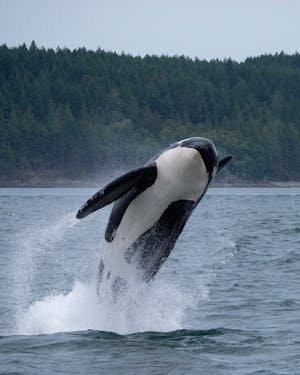
Most assuredly whales are not fish, although until a century ago most people including those who knew them best, their hunters, thought they were. Whales and me. trace the same ancient lineage through creatures born in the warm waters the primal oceans who exiled themselves to the precarious environment of the dry land. The continued to share a common ancestry through the long and slow evolution that began with the amphibians and eventually led to the mammals. But whereas our mammalian fathers stayed ashore, about a hundred million years ago, the mammalian forebears of the whales forefathers now number about one hundred species which man who is the great cataloguer, has divided into the families of the toothed and the baleen whales.
The toothed whales are the more primitive but the more various, for they include all the porpoises and dolphins, the sperm, killer and white whales and that unicorn of the sea, the narwhal. Except for the sperm, which grows to sixty feet, most of the toothed whales are relatively small, being less than for feet long.
Although they bear a superficial resemblance to fishes, whales have little common with the scaly tribe. When they return to the sea, they brought with them an intelligence of a radially new order, one that had evolved as a direct consequence of the ferocious difficulties which all terrestrial animals must face in order to survive and which reached its peak in the mammals. This legacy was shared by the ancestral whales and by the nameless creatures who were to become the progenitors of man.
In the case of our forebears, intelligence continued to develop along terrestrial lines in order to cope with the original stringent need which called it forth-the need to survive under competitive and environmental conditions of appalling severity. From this fierce struggle, man ultimately emerged with the most highly developed brain of any animal and he used it to become the most ruthless and destructive form of life ever to exist.
It was a different story with the whales. When their ancestors returned to the sea, it was to an environment which when compared to the land, was positively amiable. Instead of having to scrabble for survival on the dry, restricted, two-dimensional skin of the planet, slit as it was into fragments separated by impassable seas, they returned to the wet three-dimensional and interconnected world of water which surrounds and isolates the land. They were restored to a womb world where the climate was more stable, where there was no shortage of food and where there was no need to occupy or defend territory. Because the ancestral whales returned to this water world endowed with the survival skills so hard-won on land, they were as superior to the old, cold blooded residents of the seas as time travellers from some point millions of years in the future might be to us.
On the other hand, the emerging human shock had to battle desperately for survival in a bitterly rigorous environment, not only ahain8an array of other animals which were often physically and functionally superior but against the organized and warlike competition of their own species. The human stock would surely have been eliminated if it had not used its developing brain to invent ways of redressing the balance. Faced, as he so often was, with an intolerable climate, man learned to build shelters, use fire and make clothes. Faced with physically superior animals of other species and with deadly competition from his fellows, he made weapons. Faced with the constant spectre of starvation, he made tools with which to cultivate his own food supplies. Bit by bit he stopped replying on natural evolution to keep him alive and had to become a slave to technology.
Whales never needed technology. Going back to the sea enabled them to survive successfully as natural beings, yet they were being who, like protoman, were endowed with a great intellectual potential. What did they do with thier share of our mutual legacy? We simply do not know.
Such studies as we have made suggest that the more advanced whales have brains comparable with and perhaps, even superior to ours both in complexity and capacity. It is clear that their power to think has steadily increased even as ours has over the millennia. There can only be one reasonable assumption from all this: Whales must use their minds and use them fully in some direction, in some manner, for some purpose which evades our comprehension.
So, whales and me diverged from the common ancestry, one to becone the most lordly form of life in oceans and the other to become the dominant animal on the land. The day came when the two would meet. The meeting was not a peaceful one, in mutual recognition of each other's worth. As usual, it was man who set the terms and he chose battle. It was a one sided battle where man wielded weapons and the whales did the dying.
I invite
@patjewell
@ridwant
@josepha
@weisser-rabe
to also participate in this contest
Appreciation to @suboohi the organizer of this exciting contest
Thank you, friend!


I'm @steem.history, who is steem witness.
Thank you for witnessvoting for me.
please click it!
(Go to https://steemit.com/~witnesses and type fbslo at the bottom of the page)
The weight is reduced because of the lack of Voting Power. If you vote for me as a witness, you can get my little vote.
Downvoting a post can decrease pending rewards and make it less visible. Common reasons:
Submit
Upvoted! Thank you for supporting witness @jswit.
Downvoting a post can decrease pending rewards and make it less visible. Common reasons:
Submit